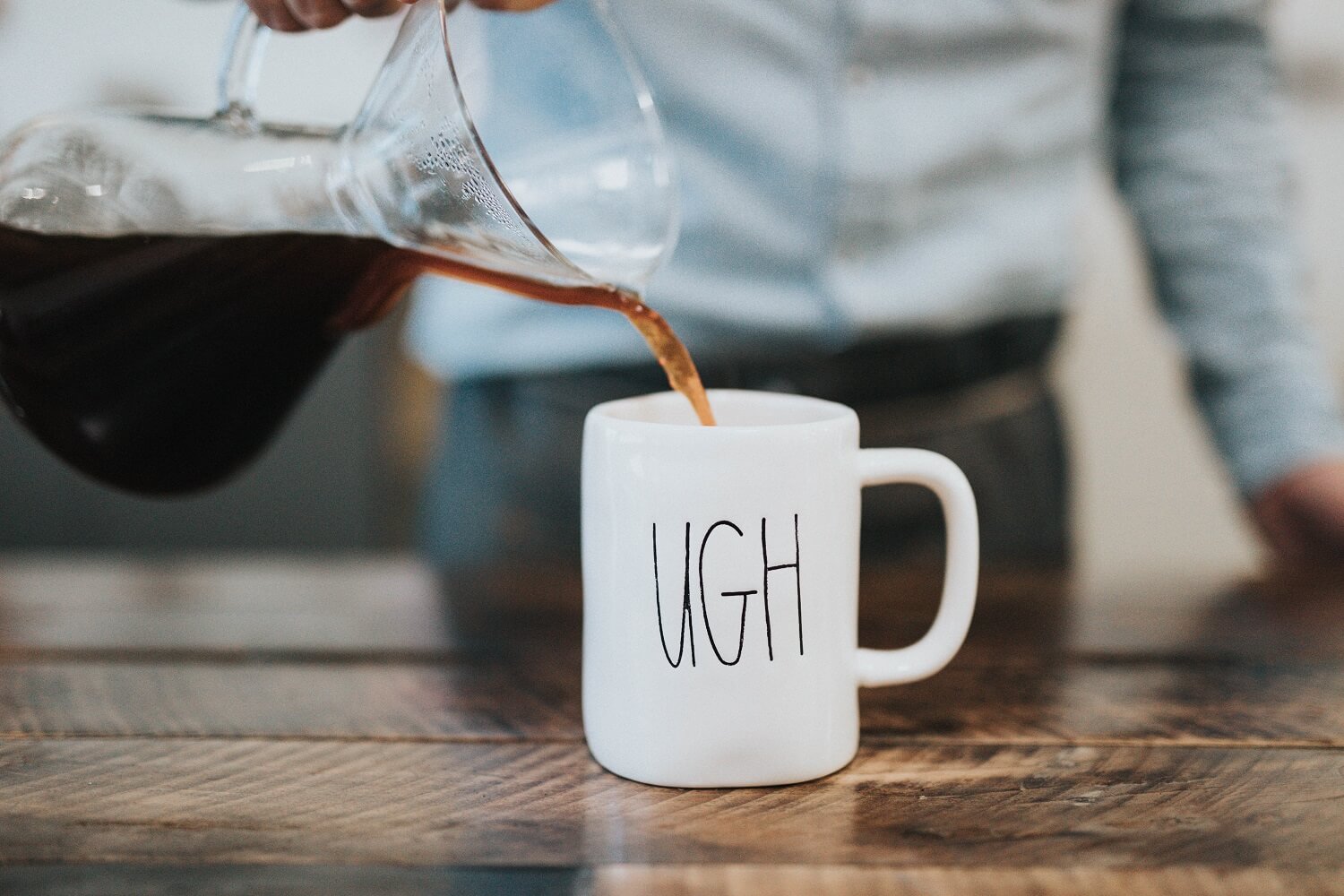Heartburn - what causes it and will food and lifestyle help?
Heartburn - An Unwelcome Visitor
I must admit heartburn was never something I ever worried about. But recently I had a week where my stomach was all upset and I got really bad heartburn which stayed with me for days and days on end!
Thinking back now, it seemed to be triggered when I’d had a really stressful day at work. As a midlifer I always seem to be juggling lots of balls at once and on that day I remember thinking ‘I don’t have time to eat lunch because I’ve got so much to do’. So I basically inhaled my lunch in about 2 minutes flat. Never mind taking time out or eating mindfully - I had too much to cram into the day! Not long after that rushed lunch, the uncomfortable, sharp acidic pain of heartburn arrived and made itself at home in my stomach for the whole week.
That made for a very uncomfortable Friday night date night, where I just felt in pain the whole time. I could even feel the acid rising when I bent over - really not good - and it took days before it gradually eased and I felt better. So now I carry a packet of Rennies in my bag just to take the edge off if that pain returns - like my dad does because his second cup of coffee gives him heartburn and he would rather take the indigestion tablets than quit the caffeine!
When I mentioned heartburn in conversation, I discovered it does seem to be a problem that many midlife friends and clients are noticing for the first time. So I thought I would have a look at some simple solutions which might just help me - and you - avoid reaching for the Rennies next time.
What Causes Heartburn and Why?
The real problem with heartburn is that it’s actually quite difficult to track down exactly what causes it and why.
The scientific explanation is that the contents of your stomach leak into the oesophagus. Certain lifestyle factors can exacerbate it, such as smoking, being overweight or eating spicy foods, but the foods that affect individuals seems to vary enormously. If being overweight is an issue for you then why not get FREE access to my weight loss webinar?
I find that for me an accumulation of certain foods, particularly wheat or sugar, over a period of time is a real trigger. If I have a meal out, maybe some alcohol on top and then continue next day with a sandwich and then a bit of cake, my stomach screams ‘enough already’ and heartburn appears. But I know it can be completely different for other people, For my husband, it’s coffee which seems to be a trigger, but that might not affect someone else the same age.
Other common symptoms include bloating, burping, difficulty swallowing, or a sore throat. Often there is a bitter or sour taste as well.
But don't get me wrong - stomach acid is essential for good health and optimal digestion.
We need the acid in our stomach to protect us against harmful microbes (i.e. bacteria) that lurk in our food and drinks. Stomach acid also helps us break down our food, and digest nutrients. But we need that acid to stay in the stomach, and not get up to our oesophagus!
Stomach acid doesn't usually burn the stomach itself; this is because the stomach is protected by a layer of mucus.
But your oesophagus doesn't have that same protection. It has a valve that is supposed to prevent things from going the wrong way (i.e. keep food, drink, and acid down; not allow it back up). And when your oesophagus is exposed to stomach acid too often, it can cause the infamous burning, inflammation, and other potential issues.
Does Heartburn Really Strike More in Midlife?
Undoubtedly midlife is an especially stressful time of life and that could be one reason why heartburn becomes a frequent and unwelcome guest. It could be because one of the issues around midlife weight gain sitting round the belly, is that creates inflammation in the body and this means indigestion can be linked to inflammation, it’s like an over-irritation. It could also be we’ve had years and years of eating certain foods and so our guts have become sensitive to it and/or midlife being particularly stressful.
One of my clients had a big issue with heartburn and when we looked into it, stress did seem to play significant part. Click here to read more about the part stress plays on your eating in one of my most popular blog posts. But hormone fluctuations, whether you’re male or female, could have an impact as well.
And of course, our bodies are slowing down and are not as efficient at coping with different foods. So, there is some evidence that heartburn does get worse as you age.
How to Hit Back at Heartburn
Anything that supports digestion is a sensible way to go, so try prebiotics or probiotics so that the gut is working as well as it can. Even something as simple as trying ginger tea will help with better digestion. There’s also some suggestion that we always assume it’s too much acid in the stomach but I think also too little stomach acid can cause indigestion and heartburn as well because it’s about the food not being digested properly. So, it’s really about trying to keep the balance within the gut and digestive system as good as possible. You can read more about healing the gut here.
Three Ways to Tackle Heartburn
Tip #1 – Think About Food to Eat and Avoid
As I discovered, you may notice that when you eat or drink certain things, you get heartburn soon afterwards. These triggers may be different for everyone; but often include onions, garlic, chocolate, citrus, tomato, mint, spicy foods, greasy foods, coffee, carbonated drinks, or alcohol. If any of these affect you, reduce them or even try cutting them out to see if it makes a difference.
Heartburn might also result from a sneaky food intolerance. Try eliminating grains, dairy, and processed foods for a few weeks and see if that helps.
You might want to track your food over the week and see if you can find a link between any foods and any symptoms. You can download your FREE food tracker here.
Try increasing fibre intake. This means more whole, unprocessed foods, especially veggies! Try getting at least five servings of veggies every day.
Tip #2 – Consider How and When to Eat
Eat slowly. Use meal times to release stress. Chew your food very well. Don’t eat meals that are too big.
And don’t eat too close to bedtime. You want to avoid lying down with a full stomach. We’re talking finishing eating 2-3 hours before lying down, so schedule dinner or snacks with this in mind.
Tip #3 – Look at Your Lifestyle Habits
Sometimes strenuous exercise can make heartburn symptoms worse. If this happens to you, then focus on low-intensity exercises like walking and cycling.
If symptoms come on as you’re lying down to sleep, try adding a pillow or two so your head is a bit higher than your stomach.
Another interesting tip is to try sleeping on your left side. Lying on your left side works because the valve that prevents the acid from "leaking" into your oesophagus is located on the right side of the stomach. So, when you're lying on your left, the acid is away from that valve.
Of course, if symptoms last for a long time, or get worse, it's probably a good idea to see your doctor.
If you feel that losing some weight might help with any digestive issues, then why not get FREE access to this online webinar all about midlife weight gain and how you can tackle it?
Content Disclaimer
The information contained above is provided for information purposes only. The contents of this blog are not intended to amount to advice and you should not rely on any of the contents of this blog. Professional advice should be obtained before taking or refraining from taking any action as a result of the contents of this blog. Midlife Menu Ltd disclaims all liability and responsibility arising from any reliance placed on any of the contents of this blog.





Overeating during lockdown can be triggered by a rollercoaster of emotions or stress from homeschooling, looking after oldens or just trying to cope with working from home. Cravings, snacking and home baking can make overeating during lockdown very easy. So here's what to do to tackle the lockdown overeating. www.midlifemenu.com/blog/overeating-lockdown